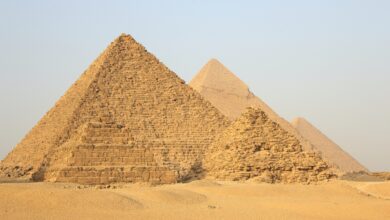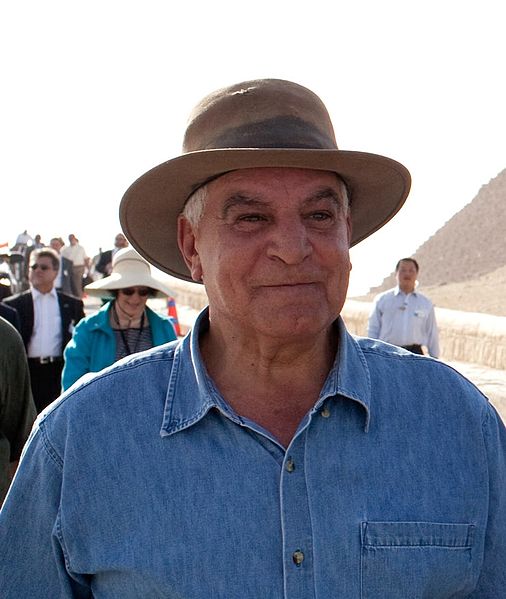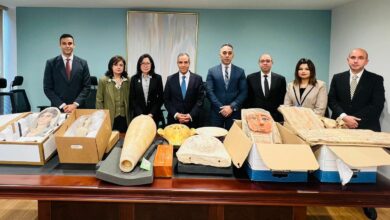Since 25 January, Egypt’s many museums and archaeological sites have been the victims of looting. Yesterday, it was announced that 54 items are missing from the Egyptian Museum, contrary to the claims of former Secretary General of the Supreme Council of Antiquities Zahi Hawass. With the constant stream of information often contradicting itself, Al-Masry Al-Youm appealed to an expert.
On 7 March, Fayza Haikal, a professor of Egyptology at the American University in Cairo, contributed to a blog post on the New Statesman website called “Egyptologists Speak Out”. In it, she and her co-authors discuss the media coverage of the looting, particularly of the Egyptian Museum, which they describe as reflecting “racism and intolerance”. Attention, they argue, should be given to the Egyptians who risked their lives to protect the antiquities.
“The reactions abroad to the safeguarding of antiquities in the 25 January Revolution are provocative and insulting," reads the blog. "In the fight for freedom and for rights taken for granted in some countries, at least 350 young Egyptians gave their lives, and hundreds more have been injured in ways that will mark them for life.”
Haikal, who has degrees from both Cairo University and Oxford and has lectured everywhere from France to the Czech Republic, spoke to Al-Masry Al-Youm about the thefts, the black market, and the heroes who protected Egypt’s treasures.
Al-Masry Al-Youm: To your knowledge, what is the extent of the looting and damage to Egyptian antiquities since 25 January?
Fayza Haikal: I think it was on 28 January that looting began, when the police withdrew from duty, but I do not clearly recall the date. We were all shocked to hear and see that the Egyptian Museum in Tahrir was first in danger from the nearby fire at the NDP building on the Corniche and then by looters penetrating the museum from a window under the roof.
In the beginning, the extent of the damage was not clearly known, and we had to wait for inventories to be done to know the damage that happened. It is considerable, particularly the pieces from the Tutankhamun collections that have been stolen, in addition to a number of equally famous pieces from the Amarna period and other very beautiful but less well-known pieces.
The looters also broke and threw on the floor a number of pieces that could be restored, and I am very grateful to the restorers who worked very intensively to restore these objects and put them again on exhibit. Lists of the missing objects are online. I am also grateful to the director of the museum and its curators who managed to work under pressure to take inventory and re-open the museum before their work was even finished.
I am also deeply moved by the heroism of the unarmed people who defended the museum as human shields in the absence of police and until they handed it to the army. Our pride in them and our debt to them are never to be forgotten.
Unfortunately, the Egyptian museum is not the only museum or site to have been looted. But, everywhere people defended their cultural heritage with the same courage. Similar examples were reported from all over Egypt, and again, thank you to them all. But the job was more than what civilians could protect because armed looters, apparently organized, as well as simple tomb robbers, have transgressed a great many important sites of Egypt and their store houses. Here again we need to wait for all inventories to be finished to know exactly what is missing. But this is already a shameful catastrophe.
Al-Masry: Tell me about the people who safeguarded the antiquities during the revolution. Why do you feel this positive story was underreported?
Fayza Haikal: I guess I feel it was underreported because (and most of my foreign friends and colleagues agreed) should such a situation have arisen anywhere else in the Western world, they doubt that ordinary citizens would have risked their lives to protect their museums.
Al-Masry: Are people continuing to protect the artifacts, or should the police return to sites?
Fayza Haikal: It is impossible for unarmed people to keep on protecting their sites forever. Fortunately, the police have finally started to go to their jobs again.
Al-Masry: Do you think the situation in Egypt will discourage other countries from returning Egyptian artifacts? Is this a legitimate defense for not returning the artifacts?
Fayza Haikal: I believe that people who use the revolution as an argument for not returning artifacts do not even deserve to be taken into consideration. These people are taking advantage of a dramatic situation to justify their point of view, a fact that is unethical and better ignored.
Al-Masry: Can the stolen artifacts be sold? How can Egypt defend against the smuggling of its artifacts out of Egypt? What is the market for Egyptian artifacts?
Fayza Haikal: Artifacts are sold when they find buyers. Thus, the only way to stop the looting is by not buying, in addition to having better protection at the sites. A very big effort was made in this respect, and a number of better-secured storing houses were built. But as everybody knows, Egypt is an open-air museum, and I challenge any country with such a huge and widely scattered heritage to be able to protect it 100 percent under circumstances such as Egypt is currently fighting.
Al-Masry: How will Zahi Hawass’s departure affect the future of Egyptology? Who do you think is the most likely choice to replace him?
Fayza Haikal: Zahi Hawass’s untimely departure is certainly leaving a big vacuum. But who can protect all this sites without police? Best of luck to his successor.



